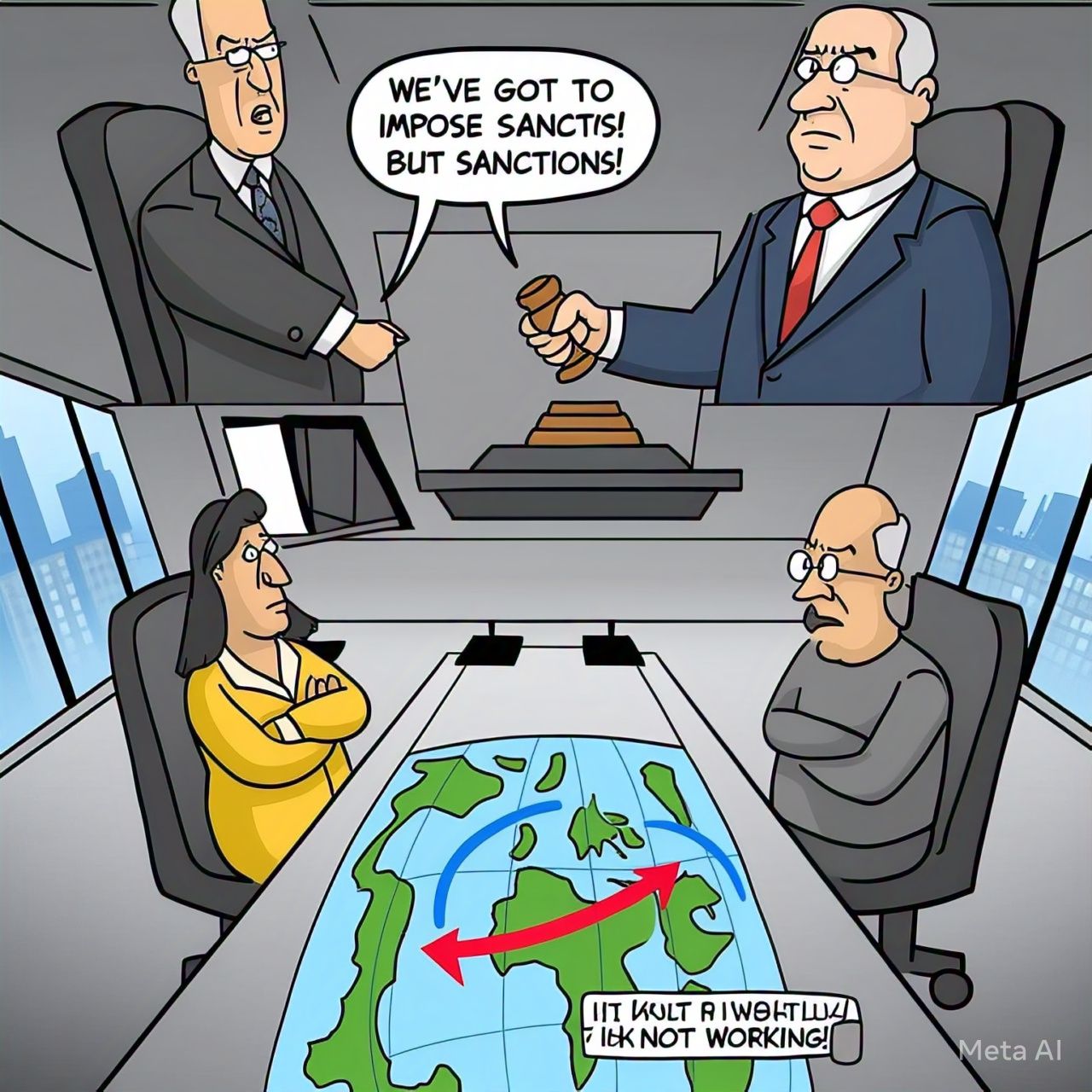
In the ever-evolving landscape of global politics, sanctions stand as a formidable tool of influence, wielded by governments and international bodies alike to enforce compliance, punish wrongdoing, or alter state behavior. This weapon of diplomacy is often seen as a non-violent alternative to war, a way to impose economic pressure on a nation to achieve specific geopolitical objectives. But despite their widespread use, the question remains: Do sanctions truly work, or do they often backfire, causing more harm than good?
The Mechanisms of Sanctions
At its core, sanctions are designed to alter the behavior of a target state by imposing economic pressure. They serve as a form of coercion, attempting to force a country to change its actions without resorting to military confrontation. However, the effectiveness of these measures is often debated. The imposition of sanctions can take many forms, each targeting a different aspect of the target nation’s economy, politics, or military capabilities. Some of the most common types include:
- Economic Sanctions: These are perhaps the most well-known type of sanctions and include measures like trade restrictions, asset freezes, and financial blockades. The goal is often to cripple a nation’s economic infrastructure by cutting off vital resources, reducing its access to global markets, and isolating it from the international financial system.
- Diplomatic Sanctions: These involve actions such as downgrading or severing diplomatic ties, expelling ambassadors, or excluding the target nation from international organizations like the United Nations or the World Trade Organization (WTO). The aim here is to isolate the target country diplomatically, weakening its global standing and making it more difficult to engage with other nations.
- Military Sanctions: These sanctions focus on restricting a country’s military capabilities, such as imposing arms embargoes or limiting military cooperation. By restricting the flow of weapons or technology, these sanctions seek to prevent the target country from strengthening its military force.
- Targeted Sanctions: Unlike blanket sanctions that affect an entire nation, targeted sanctions are aimed at specific individuals, corporations, or political elites within the country. These measures are designed to exert economic pressure directly on those who hold power, thus reducing the chances of harming the broader population while still achieving the desired political impact.
While sanctions are often deployed as a substitute for military action, their effects are complex and multifaceted. For example, while they are meant to hurt the leadership, the economic fallout often impacts the general populace the hardest, creating a paradox in which the government becomes more entrenched in power.
Historical Successes of Sanctions
Despite the complexity and unpredictability of sanctions, they have achieved notable successes in the past, often altering the course of global affairs. One of the most cited examples is the case of South Africa during the apartheid era. In the 1980s, the international community, particularly Western countries, imposed a series of economic sanctions designed to put pressure on the apartheid regime. These measures, which included trade restrictions and financial sanctions, played a significant role in the eventual dismantling of apartheid and the transition to a democratic South Africa under Nelson Mandela.
Similarly, the sanctions imposed on Iran, particularly after the 2006 United Nations sanctions and the tightening of U.S. measures, brought Iran to the negotiating table. These economic pressures, combined with the broader geopolitical situation, were instrumental in the eventual signing of the 2015 Joint Comprehensive Plan of Action (JCPOA), which saw Iran agree to halt certain aspects of its nuclear program in exchange for relief from sanctions.
In these cases, sanctions successfully brought about political change by creating sufficient economic pressure to force governments to negotiate or adjust their policies. However, these examples are not the norm, and the impact of sanctions varies significantly from case to case.
Sanctions That Have Backfired
While there are success stories, there are also numerous instances where sanctions have failed or even worsened the situation. One of the most notable failures has been the U.S. embargo on Cuba, which has been in place for over 60 years. Despite enduring economic warfare and significant hardship, the Castro regime has managed to stay in power, with no indication that the sanctions will bring about a regime change. Instead, the embargo has acted as a rallying point for the Cuban government, reinforcing its narrative of resistance to imperialism. The sanctions have not only failed to weaken the regime but have also isolated Cuba from the global economy, exacerbating the suffering of the Cuban people.
Similarly, sanctions against North Korea, imposed by the international community to curb its nuclear ambitions, have had limited impact. Despite heavy sanctions that have isolated the country from much of the global market, North Korea has continued its nuclear development and engaged in provocative actions. Instead of forcing the regime to change course, the sanctions have entrenched its hold on power and led to a strengthening of ties with China and Russia—two key allies that have shielded North Korea from some of the harshest international measures. In this case, the sanctions have inadvertently contributed to the country’s strategic realignment, further complicating efforts to resolve the crisis.
Another example is the sanctions imposed on Russia following its annexation of Crimea in 2014. While these measures were designed to pressure Russia into withdrawing from Ukraine, the sanctions have had mixed results. Rather than forcing Russia to back down, the sanctions have led to greater political and economic cooperation between Russia and China, particularly in the areas of energy and trade. Russia’s pivot towards non-Western markets has allowed it to mitigate the impact of economic pressure, making the sanctions less effective than anticipated. This example highlights the unintended consequences of sanctions and the way they can drive countries into new alliances, thus reshaping global power dynamics.
The Geopolitical Consequences of Sanctions

The imposition of sanctions is rarely a straightforward process. Instead, they often trigger a series of geopolitical conflicts and realignments. In many cases, countries that are sanctioned seek to circumvent these measures by strengthening ties with other nations, sometimes those with opposing geopolitical interests.
For example, in response to Western sanctions, Russia has turned increasingly toward China. The two countries have strengthened their political and economic ties, engaging in joint ventures in energy, trade, and technology. This shift in alliances has implications not just for Russia and the West but for the entire global order. The rise of a China-Russia axis, fueled in part by sanctions, represents a challenge to the traditional Western-dominated geopolitical landscape.
Similarly, sanctions can exacerbate existing geopolitical conflicts by pushing targeted countries into the arms of regional powers. For instance, Iran’s economic warfare with the West has led to closer cooperation with Russia, China, and other countries in the region. This shift has altered the balance of power in the Middle East, with sanctions pushing Iran to seek new alliances, many of which complicate efforts to address regional issues like the Syrian civil war or the Israeli-Palestinian conflict.
In these cases, the imposition of sanctions can inadvertently fuel geopolitical conflicts by driving targeted countries closer to rival powers, thus increasing tensions and making it harder to resolve broader regional or global issues.
The Role of Diplomacy in Sanctions
While sanctions are often viewed as a punitive measure, they are also a tool in the broader arsenal of diplomacy. In many cases, sanctions are imposed as part of a larger strategy aimed at encouraging diplomatic negotiations. When applied correctly, they can serve as a signal to a target state that its actions are unacceptable and that negotiations are the preferred alternative to further isolation or military confrontation.
The use of sanctions as part of a diplomatic strategy is best illustrated by the negotiations that led to the Iran nuclear deal. In this case, economic pressure was used to bring Iran to the table, but the eventual resolution came through diplomacy—the lifting of sanctions in exchange for Iran’s commitment to curbing its nuclear program. This approach highlights the potential for sanctions to complement, rather than replace, diplomatic efforts.
However, there is a fine balance. The overuse or heavy-handed application of sanctions can undermine diplomacy, making countries more resistant to negotiations. If sanctions are imposed unilaterally or without clear objectives, they can alienate the target state and reduce the chances of successful diplomatic engagement. Sanctions should be viewed not as an end in themselves but as part of a broader strategy that includes both coercion and dialogue.
Conclusion: A Powerful but Unpredictable Tool
Sanctions are undeniably a significant tool in the world of global politics, but their effectiveness is far from guaranteed. While they have successfully altered the behavior of certain states, they have also failed or backfired in numerous instances. The unintended consequences of sanctions—including humanitarian suffering, the entrenchment of authoritarian regimes, and the deepening of geopolitical conflicts—should not be underestimated.
Ultimately, sanctions should be viewed as part of a broader strategy of economic pressure and diplomacy, not as a stand-alone solution. Their success depends on multilateral support, careful design, and the willingness of the international community to work together toward a common goal. In the end, sanctions are a tool—one that can shape the course of international relations, but only if wielded with care, precision, and a clear understanding of their potential consequences.


